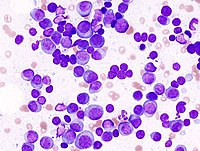
Photo from wikipedia
OBJECTIVE To evaluate the efficacy and safety of elotuzumab and dexamethasone (Ed) for relapsed or refractory multiple myeloma (RRMM) patients. METHOD This retrospective study evaluated the efficacy and safety of… Click to show full abstract
OBJECTIVE To evaluate the efficacy and safety of elotuzumab and dexamethasone (Ed) for relapsed or refractory multiple myeloma (RRMM) patients. METHOD This retrospective study evaluated the efficacy and safety of Ed treatment for 21 RRMM patients, 11 of whom were considered lenalidomide-refractory, and all of whom had progressed on at least 1 prior steroid-containing regimen. We also evaluated the efficacy of adding lenalidomide to a subset of patients following progression from Ed. RESULTS The overall response rate (ORR) and clinical benefit rate (CBR) of Ed were 10% and 19%, respectively. An additional 52% of patients demonstrated stable disease as their best response. The median PFS was 1.8 months on Ed for all patients. Fifteen patients received ERd following progression on Ed, and 60% of these patients were lenalidomide-refractory. The ORR and CBR were 20% and 33%, respectively, and the median PFS was 3.4 months. CONCLUSION Our results suggest that some patients can benefit from Ed without an accompanying immunomodulatory agent and that efficacy can be achieved with the addition of lenalidomide at the time of progression. No new safety signals were detected, except for thrombocytopenia in 1 patient on Ed.
Journal Title: European Journal of Haematology
Year Published: 2018
Link to full text (if available)
Share on Social Media: Sign Up to like & get
recommendations!